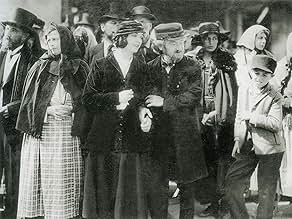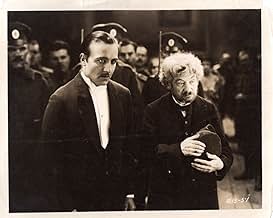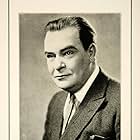Añade un argumento en tu idiomaDuring World War I, a hotel maid and Austrian officer in hiding attempt to survive in a Russian-occupied town.During World War I, a hotel maid and Austrian officer in hiding attempt to survive in a Russian-occupied town.During World War I, a hotel maid and Austrian officer in hiding attempt to survive in a Russian-occupied town.
- Dirección
- Guión
- Reparto principal
- Premios
- 2 premios en total
Ruth Feldman
- Woman in Parade Crowd
- (sin acreditar)
Josef Swickard
- Austrian General
- (sin acreditar)
Mike Tellegen
- Passport Inspector
- (sin acreditar)
Carl von Haartman
- Russian Soldier
- (sin acreditar)
Reseñas destacadas
Set early in World War I, Lieutenant Paul Almasy tries to escape to the Austrian army lines from Russian occupied Austria, but ends up in a small hotel, saved by chambermaid Anna Sedlak (Pola Negri). A Russian general makes the hotel his headquarters and chases Anna, who has fallen for the Paul. They must stop a dangerous spy and save the Austrian army and Paul's life.
Starts slowly and has a lot of filler, especially stock footage of WW I action. They could also have left off the Hollywood ending, which is obvious once it starts. The action in the middle is somewhat better done, especially the scenes with Anna and the General.
Thought to be the only Hollywood work by Mauritz Stiller to have survived.
The same play was also filmed in 1936 as I Loved a Soldier, in 1939 and in 1943 as Five Graves to Cairo.
Starts slowly and has a lot of filler, especially stock footage of WW I action. They could also have left off the Hollywood ending, which is obvious once it starts. The action in the middle is somewhat better done, especially the scenes with Anna and the General.
Thought to be the only Hollywood work by Mauritz Stiller to have survived.
The same play was also filmed in 1936 as I Loved a Soldier, in 1939 and in 1943 as Five Graves to Cairo.
I was lucky enough to see this film at a recent screening at the Museum of Modern Art. The print was beautiful, it was accompanied with live music, and the audience was large and enthusiastic. When the show was over people were buzzing, and I couldn't help but wonder: why isn't Mauritz Stiller's Hotel Imperial better known? It's a stylistic triumph that should be remembered and celebrated for first-rate direction, cinematography and sets. True, there are a couple of unlikely plot twists along the way, and the ending is a little more schmaltzy than one might like, but over all this film's virtues far outweigh its flaws. And notably, it features an excellent performance by Pola Negri, an actress better remembered for her off-screen eccentricities and diva-like behavior than for any of her movies. Here she proves she could give a nuanced, convincing performance as a chambermaid who shows genuine valor in wartime.
Viewers familiar with Billy Wilder's 1943 drama Five Graves to Cairo will find that Stiller's film provided Wilder's source material. The original story is set in an Austrian village during the early days of the First World War. A wounded Austrian lieutenant named Almasy stumbles into a nearly deserted hotel, where Anna the chambermaid (Negri) chooses to give him refuge despite the danger to herself. At her behest he disguises himself as the hotel's waiter, and stays on when Russian troops take over the town and commandeer the hotel. Because of his close proximity to the enemy the lieutenant is able to interfere with the Russians' plans -- with Anna's help -- and alter the course of the battle.
What happens in this film isn't as important as how it is presented. Here, atmosphere is more important than plot. Like all the best silent films this one utilizes very few title cards; remarkably, there are none at all for the first ten minutes or so. The camera smoothly follows a group of exhausted soldiers on horseback as they make their way across the smoking wasteland. No one speaks; there's nothing to be said. Stiller conveys a great deal with evocative imagery, sharp editing, and the understated performances of his players. You won't find any exaggerated emoting here. Once the lieutenant has assumed his false identity the suspense builds and our empathy with the central couple deepens. The leading lady is especially impressive in a scene where she must pretend to enjoy the lecherous advances of a Russian general in order to buy time for the lieutenant, who she loves; her forced gaiety and the dead look in her eyes perfectly express her feelings. Leading man James Hall is forgotten today (sadly, his life and career were blighted by acute alcoholism) but he is memorable as Lieutenant Almasy and pairs well with Negri. We care about this couple, fear for them, and root for them.
I'd say this movie deserves to be ranked with the strongest dramas of the late silent era, perhaps not in the very top tier with The Docks of New York and The Man Who Laughs, but not far behind. It certainly deserves to be as well remembered as such war dramas as Wings and Seventh Heaven. There's little else to add except that silent film buffs should seek it out, and see it with an audience if at all possible.
Viewers familiar with Billy Wilder's 1943 drama Five Graves to Cairo will find that Stiller's film provided Wilder's source material. The original story is set in an Austrian village during the early days of the First World War. A wounded Austrian lieutenant named Almasy stumbles into a nearly deserted hotel, where Anna the chambermaid (Negri) chooses to give him refuge despite the danger to herself. At her behest he disguises himself as the hotel's waiter, and stays on when Russian troops take over the town and commandeer the hotel. Because of his close proximity to the enemy the lieutenant is able to interfere with the Russians' plans -- with Anna's help -- and alter the course of the battle.
What happens in this film isn't as important as how it is presented. Here, atmosphere is more important than plot. Like all the best silent films this one utilizes very few title cards; remarkably, there are none at all for the first ten minutes or so. The camera smoothly follows a group of exhausted soldiers on horseback as they make their way across the smoking wasteland. No one speaks; there's nothing to be said. Stiller conveys a great deal with evocative imagery, sharp editing, and the understated performances of his players. You won't find any exaggerated emoting here. Once the lieutenant has assumed his false identity the suspense builds and our empathy with the central couple deepens. The leading lady is especially impressive in a scene where she must pretend to enjoy the lecherous advances of a Russian general in order to buy time for the lieutenant, who she loves; her forced gaiety and the dead look in her eyes perfectly express her feelings. Leading man James Hall is forgotten today (sadly, his life and career were blighted by acute alcoholism) but he is memorable as Lieutenant Almasy and pairs well with Negri. We care about this couple, fear for them, and root for them.
I'd say this movie deserves to be ranked with the strongest dramas of the late silent era, perhaps not in the very top tier with The Docks of New York and The Man Who Laughs, but not far behind. It certainly deserves to be as well remembered as such war dramas as Wings and Seventh Heaven. There's little else to add except that silent film buffs should seek it out, and see it with an audience if at all possible.
I admit I am not on the same page as the other folks on here: I do not view Hotel Imperial (1927) as a lost gem from the silent era. It is beautifully directed and shot, with fluid cinematography and mostly competent performances. Negri shines brightest, bringing her naturalistic acting and passion to her performance. It is she who makes this film so memorable.
The story is what brings everything down. The story is meant to be good drama, but the lack of subtlety in the villains and lapses of intelligence in most of the characters just drags everything down.
A beautifully made but certainly not classic film. Watch for the atmosphere and Negri.
The story is what brings everything down. The story is meant to be good drama, but the lack of subtlety in the villains and lapses of intelligence in most of the characters just drags everything down.
A beautifully made but certainly not classic film. Watch for the atmosphere and Negri.
It is the first movie that I've watched starring the legendary silent movie star Pola Negri; it's no secret that most of her movies from 1920s were sadly lost (as so many great ones from that era are also) but I managed to get me "Hotel Imperial" of decent quality and watched it in one take. The copy that I had did have some strange musical arrangements and score that was abruptly ending and beginning mid-scene but despite that unnerving fact I was still capable of enjoying this movie. It tells a story of a soldier lost among the enemy lines and having to pose as a servant at a local hotel. Pola Negri plays a chambermaid in this hotel who is not only corageous considering the conditions she had to work under but selfless, caring, cool-headed and brave too and Pola portrays her excellently. The acting overall is top-notch and you can't take your eyes off the screen. The only issue I have with this movie is that by the end it gets a little naive and unrealistic whereas it was very real at the beginning.
10c21jackg
A great movie - very entertaining from start to finish - the video release available from Grapevine is lacking only in the fact that the musical accompaniment is below average. However, that does not diminish the fact that Pola truly was a star and her on screen magnetism shines in this World War I themed movie. A must for silent movie fans.
¿Sabías que...?
- ConexionesFeatured in Life Is a Dream in Cinema: Pola Negri (2006)
Selecciones populares
Inicia sesión para calificar y añadir a tu lista para recibir recomendaciones personalizadas
Detalles
- Fecha de lanzamiento
- País de origen
- Idioma
- Títulos en diferentes países
- Отель «Империал»
- Localizaciones del rodaje
- Empresa productora
- Ver más compañías en los créditos en IMDbPro
- Duración1 hora 25 minutos
- Mezcla de sonido
- Relación de aspecto
- 1.33 : 1
Contribuir a esta página
Sugerir un cambio o añadir el contenido que falta

Principal laguna de datos
By what name was Hotel Imperial (1927) officially released in Canada in English?
Responde















